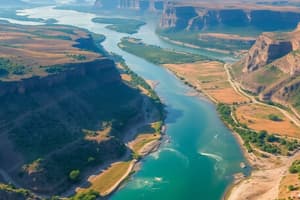Podcast
Questions and Answers
What is the main reason behind the growing global concern over water scarcity?
What is the main reason behind the growing global concern over water scarcity?
The main reason for growing concern about water scarcity is a combination of factors including population growth, climate change, and unsustainable water use.
Describe two ways in which water resources are essential to human life.
Describe two ways in which water resources are essential to human life.
Water resources are essential for agriculture to grow crops and food, and for industry to manufacture products and generate energy.
Explain how groundwater and surface water are different.
Explain how groundwater and surface water are different.
Groundwater is water stored beneath the Earth's surface, often in underground aquifers, while surface water is found in rivers, lakes, and wetlands.
Identify the largest water user globally and explain why this sector consumes so much water.
Identify the largest water user globally and explain why this sector consumes so much water.
What are two issues that can arise from excessive water use?
What are two issues that can arise from excessive water use?
Explain how industrial discharge and agricultural runoff can impact water resources.
Explain how industrial discharge and agricultural runoff can impact water resources.
How can climate change exacerbate water resource issues?
How can climate change exacerbate water resource issues?
Describe the importance of understanding the geographical distribution of water resources.
Describe the importance of understanding the geographical distribution of water resources.
How do geographic factors such as elevation and rainfall patterns influence water availability?
How do geographic factors such as elevation and rainfall patterns influence water availability?
Why is it important to study the interactions between surface water and groundwater?
Why is it important to study the interactions between surface water and groundwater?
What role does efficient irrigation play in sustainable water management?
What role does efficient irrigation play in sustainable water management?
How do integrated river basin management practices contribute to equitable water access?
How do integrated river basin management practices contribute to equitable water access?
What are the environmental impacts of ineffective water use projects?
What are the environmental impacts of ineffective water use projects?
Flashcards
Surface water and groundwater interaction
Surface water and groundwater interaction
The relationship between surface water (like rivers and lakes) and groundwater (underground water) and how they interact.
Geographic influences on water
Geographic influences on water
Factors like altitude, rainfall patterns, and landscape shape affect how much water is available in an area.
Sustainable water management
Sustainable water management
Practicing water management that protects the environment and ensures water is available for future generations.
Water conservation measures
Water conservation measures
Signup and view all the flashcards
Water infrastructure rehabilitation
Water infrastructure rehabilitation
Signup and view all the flashcards
What is Geography?
What is Geography?
Signup and view all the flashcards
What is Physical Geography?
What is Physical Geography?
Signup and view all the flashcards
What is Human Geography?
What is Human Geography?
Signup and view all the flashcards
Why are water resources important?
Why are water resources important?
Signup and view all the flashcards
Types of water resources
Types of water resources
Signup and view all the flashcards
What are the dangers of overuse of water?
What are the dangers of overuse of water?
Signup and view all the flashcards
What are the dangers of water pollution?
What are the dangers of water pollution?
Signup and view all the flashcards
How does Geography help us manage water?
How does Geography help us manage water?
Signup and view all the flashcards
Study Notes
Introduction to Geography
- Geography studies Earth's physical features, processes, and human activities, examining their distribution across the Earth's surface.
- It's a spatial science.
- Geography divides into physical (natural features) and human (human activities) geography.
- Studies often focus on the interaction between humans and the environment.
Water Resources
- Water resources are vital for all life, crucial for agriculture, industry, and daily life.
- Water scarcity is a growing global concern, driven by population growth, climate change, and unsustainable water use.
- Clean and safe drinking water is a fundamental human right.
Types of Water Resources
- Surface water comprises rivers, lakes, and wetlands.
- Groundwater is stored below the Earth's surface.
- Glacial ice, while a major water resource, is often inaccessible for human use.
- Atmospheric water (precipitation) affects runoff and water storage in accessible forms.
Water Uses
- Agriculture globally uses the most water, often relying on groundwater.
- Industry needs large amounts for processes like manufacturing and energy.
- Domestic use covers drinking, cooking, and hygiene.
- Recreation (swimming, boating, fishing) relies on water.
- Environmental preservation (wetlands, ecosystems) depends on water availability.
Issues Related to Water Resources
- Water pollution (industrial discharge, agricultural runoff, sewage) harms human health and ecosystems.
- Overusing water resources depletes groundwater and reduces river flows, impacting ecosystems.
- Sustainable water use requires effective management practices and policies.
- Climate change intensifies water resource issues, causing more droughts and floods.
- Equitable water access remains a global challenge.
Water and Geography
- Understanding the geographical distribution of water is vital for effective management.
- Factors like elevation, rainfall patterns, and topography influence water availability and distribution.
- Studying relationships and interactions between surface water and groundwater is crucial.
- Knowing water availability helps assess the viability and environmental impact of water projects.
Water Management
- Sustainable water management practices ensure long-term availability.
- Efficient irrigation, water conservation, and wastewater treatment can address scarcity.
- Comprehensive planning, integrated river basin management, and effective legislation ensure equitable water access and usage.
- Government projects to restore water infrastructure can improve productivity, management, and reduce waste.
Studying That Suits You
Use AI to generate personalized quizzes and flashcards to suit your learning preferences.




